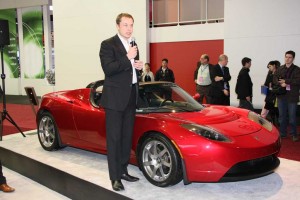
Top Gear officials defend their criticism of the Tesla Roadster - shown here with Tesla founder Elon Musk.
The executive producer of the popular BBC car program, Top Gear, is firing back at Tesla Motors.
Andy Wilman dismissed the California battery car maker’s claims that Top Gear lied about the result of its test drive of the Tesla Roadster, a two-seat sports car that was profiled in a 2008 broadcast.
That program has been targeted by Tesla in a libel suit it has filed against the BBC and Top Gear in the British Courts. Tesla officials have launched an aggressive campaign to get their side of the story aired, Vice President Ricardo Reyes claiming the Top Gear program’s conclusion was “written before the cars were tested.”
Tesla leveled a number of charges against Top Gear, accusing it of lying about the need to charge the Roadster after just 55 miles, and for claiming, among other things, that the car’s brakes failed.
Initially, BBC officials declined to comment, but the flurry of coverage for the Tesla suit led Wilman to go public.
For one thing, he says a blown fuse made it difficult to work the brakes – and that Tesla representatives required Top Gear to fix the problem before continuing the test.
“Well – to my mind, if the brakes are broken, then they’re broken, and if this happened to your car, you’d take it to the garage to get it fixed,” Wilman said in a blog post.
As for the limited range – well short of the 200-plus miles Tesla claims for the 2-seater – Wilman says it was “calculated” by a Tesla “boffin” – British slang for a scientist or researcher — using the previous day’s test data.
The Top Gear episode – which has been widely rebroadcast since its first airing – wasn’t entirely critical. Noting the Tesla Roadster’s 3.9 second 0 to 60 times, host Jeremy Clarkson described it as “biblically quick. This car is electric, literally.”
But Clarkson’s conclusion was significantly harsher, declaring that, “in the real world, it doesn’t work.”
Tesla officials are centering their criticism – and the lawsuit — on that claim and their contention is was actually written before the filmed testing of the Roadster.
For his part, producer Wilman acknowledges what might seem to be an out-of-sequence process.
“Our primary reasoning behind the verdict had nothing to do with how the Tesla performed; our conclusion was based mainly on the fact that it costs three times more than the petrol sports car upon which it’s based. It takes a long time to recharge, so you can’t use it as easily for the carefree motoring journeys that are a prerequisite of sports car driving. You can actually reach that conclusion without driving the car.”
(For the original report on the Tesla lawsuit, Click Here.)
